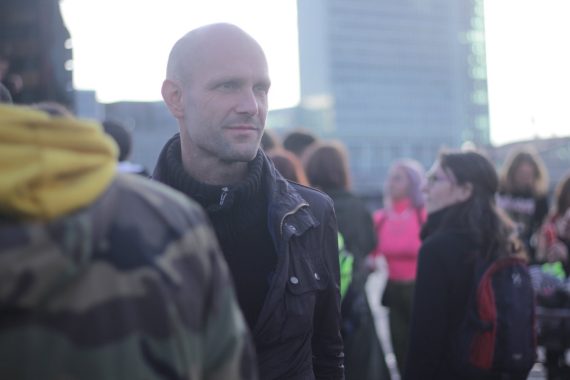The Netherlands listed a Dutch pacifist activist on a terrorism list and shared his data with Europol, the European police agency, and Interpol, the international police agency. Here are the risks the activist is now facing.
Surveillance society
The threat of terrorism and organized crime has led countries around the world to develop surveillance systems meant to prevent attacks and crimes. Large scale databases have been set up to inform law enforcement authorities about the activities, movements, and statements of suspected persons.
Because of the movement of suspects across borders, police authorities cooperate and exchange information about their identity and whereabouts.
Interpol and Europol store information on persons in the form of alerts sent by national police authorities. Those alerts request for a particular action to be taken such as the surveillance, arrest, detention or the deportation of the person.
A Dutch pacifist activist on a terrorism list
For years, Frank van der Linde has been advocating for social justice. He has demonstrated and publicly defended anti-racism causes and the rights of the Palestinians.
In 2014, the Dutch police and the National Coordinator for Counterterrorism and Security (NCTV) started surveying van der Linde, including by recording his statements on Twitter. From 2017 to 2019, they added his personal data to a terror list alongside terrorist suspects and shared this information with Europol and Interpol. Since then, the police referred to Frank activities with a CTER-code (Counter Terrorism Extremism and Radicalization).
In October 2018, for the first time, van der Linde requested the police provide him with the information they stored about him, and he learned about being surveilled. In February 2019, police agencies including the NCTV recognized Frank’s activism as non-violent and removed him from the terrorism list.
Nonetheless, van der Linde’s determined activism continued to cause confrontation with the police. In 2020, he was arrested 18 times: 14 times for demonstrating on Dam Square, Amsterdam to support Palestinians and once for a tweet in which he asked his followers to squat more houses to fight the housing crisis. The police continued referring to van der Linde in their records with the CTER code.
Van der Linde’s determined activism continued to cause confrontation with the police. In 2020, he was arrested 18 times: 14 times for demonstrating on Dam Square, Amsterdam.
In April 2021, the Court of Amsterdam recognized that the police could not justify keeping a record of van der Linde’s data with a CTER code since he was not on the terrorism list anymore. The court decided that records with a CTER code should be deleted from his police file – at least those between June 2017 and March 1, 2019.
The issue is that the Dutch police keep referring to van der Linde with a CTER code because of their assessment of his behaviour and statements. The decision to register and remove someone from the terror list can only be done by national police agencies; however, nothing forbids the police from continuing to refer to someone with the CTER code.
Black Boxes of Information
Interpol’s constitution, adopted in 1956 after the police agency had briefly fallen into Nazi hands, states neutrality as one of the main principles guiding its actions. The organization is strictly forbidden to undertake any intervention or activities of a political, military, religious or racial character (Article 3, Interpol Constitution).
Interpol’s red notices have been used by states to track and imprison political opponents who have fled their home countries.
Similarly, Europol as a European agency adheres to the key principles of good governance promoted by the Ombudsman’s European Code of Good Administrative Behaviour, including impartiality.
Interpol’s red notices have been used by states to track and imprison political opponents who have fled their home countries. Recognized refugees fleeing persecution have been targeted with alerts asking for their detention and return.
Vivid criticism from members of civil society led to the reform of Interpol and to the creation of the Commission for the Control of Interpol’s Files (CCF) that reviews whether alerts are in line with Interpol’s rules. In practice, however, plenty needs to be done, and the vetting system remains inconsistent and secretive.
The European Data Protection Supervisor (EDPS), the supervisory authority for Europol, admonished the European police agency last year for collecting information outside of its mandate. Large scale databases were sent by member states to Europol’s big data case for analysis. Due to the number and complexity of the information, the police agency stored them all before reviewing them.
Vivid criticism from members of civil society led to the reform of Interpol and to the creation of the Commission for the Control of Interpol’s Files (CCF) that reviews whether alerts are in line with Interpol’s rules
The decision to transfer personal data to a police agency should not be taken lightly. To protect the principle of impartiality and individual rights, police agencies should review all data shared by states before making them available in their system.
Recommended
Who polices the police?
Van der Linde’s information has been removed from the Dutch terror list.
However, there is no automatic deletion from Interpol and Europol systems after the data has been deleted from the national database.
Europol has decided in this case to keep the data in its database. The EDPS is currently reviewing Europol’s decision to refuse van der Linde’s request for information. The supervisory authority has nonetheless no enforcing power on Europol. Indeed, Europol’s big data case has not been followed by corrective measures from the police agency. On the contrary, the recent reform proposal by the commission regarding Europol regulation will legalize the unlawful practices of the police agency.
In May, the Court of Justice of the European Union (CJEU) decided on the case of a German citizen who after suspicion of fraud had his personal information recorded in a red notice by Interpol. After settling the case in Germany with the payment of a fine, he complained that his data continued to be stored by Interpol due to an alert based on the same fraud in the United States.
The court of Luxembourg ruled that the person should not be prosecuted in the Schengen Area for a case previously resolved in another Schengen country. Once the alert has been proven to concern a matter already dealt with by a Court, it will be ignored by the Member State of the European Union, despite the alert being applicable elsewhere.
So even though the initial alert was removed from the national database, Europol and Interpol can continue to store data about a person. This is particularly worrying for activists who can be targeted by countries around the world for their political activism at home.
A dangerous security rhetoric
Pacifist activists like Frank van der Linde should be removed from terrorism lists, have their names cleared, and be compensated for the impact of such a decision. Up until now, there has been no effective remedy in Frank’s case against unlawful police surveillance and the impact on his personal life.
The impact of surveillance systems on peaceful activists should be at the heart of the debate on reforming police agencies, in particular the upcoming reform of the Europol regulation. Politicians around the world, in particular after a terrorist attack, puts forth that police agencies should process more information to guarantee national security.
But the amount of information stored does not shield Interpol and Europol from being “weaponized” for political gain. In fact, it endangers activists who are pacifically voicing their opposition to a national policy, even more so now that the newly elected president of Interpol is a general from the United Arab Emirates who is accused of complicity in torture.






